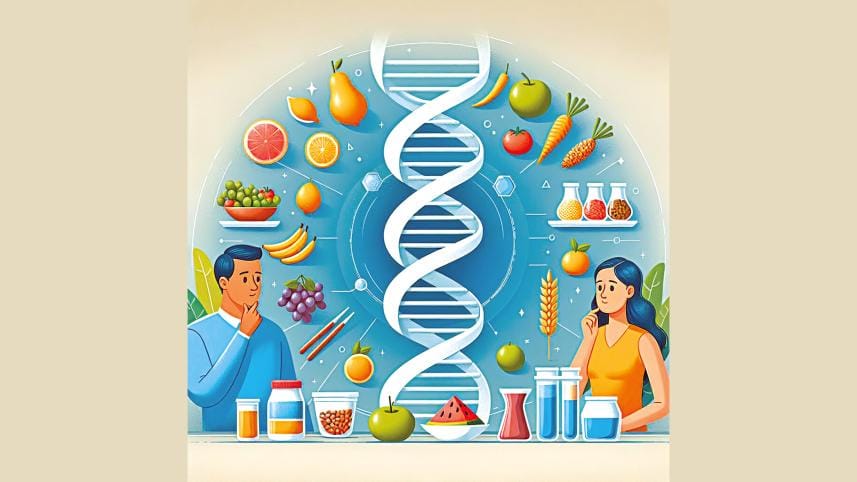How nutrition shapes our genes: the promise of nutrigenomics

Other than making the body function and providing it with all the nutrients, our diet interacts with genes themselves to affect long-term health by altering gene expression. Nutrigenomics is a new area of study that links nutrition and genetics. New insights into disease prevention and individualised nutritional plans are also offered.
Nutrigenomics is a study of nutritional science that explores the interaction of dietary components with genes in regulating health and disease. It investigates molecular mechanisms, including gene expression, epigenetic modifications, and genetic variations, which dictate an individual's unique response to nutrients.
Nutrients and bioactive compounds may directly influence gene expression, the process by which the instructions in DNA are converted into a functional product, such as a protein. For example, some dietary components have been found to activate or suppress genes that influence metabolic pathways, immune responses, and disease susceptibility.
Moreover, epigenetics—DNA methylation, histone modifications, and interactions with non-coding RNA—is an important mechanism in the regulation of gene activity without changes to the genetic code. Studies have documented that a diet rich in folate, choline, and B vitamins ensures DNA methylation, a process crucial for appropriate cellular activities and the prevention of disease.
Dietary effects on gene expression: Micronutrients like vitamins and minerals, being the cofactors, participate in many biochemical reactions regulating gene activity. For example, folate (Vitamin B9) is necessary in methylation processes that affect genes responsible for an individual's susceptibility to cancer, cardiovascular disease, and neural development.
Macronutrient-metabolic pathways: Even the macronutrients—proteins, fats, and carbohydrates—affect genetic expression. Omega-3 fatty acids from fish and flaxseeds activate genes that reduce the synthesis of pro-inflammatory prostaglandins and promote the breakdown of triglycerides, reducing the risk for coronary artery disease.
Bioactive compounds and protective gene activation: Phytochemicals like polyphenols (from green tea, berries, and dark chocolate) activate the Nrf2 pathway, which amplifies the antioxidant and detoxification defences of the body.
Genetic variations and personalised nutrition: The future of health care will depend on personal nutrition, or nutritional plans prescribed according to a person's genotype. An excellent example here is the MTHFR gene that determines a particular type of folate metabolism. Individuals possessing a mutation of MTHFR show impaired utilisation of folates and hence a higher risk for cardiovascular disorders, neural tube defects, and mental instability. This vulnerability could be modified by adjusting the intake of folates.
Similarly, the APOE gene affects cholesterol metabolism, whereby carriers of the APOE4 variant are at a higher risk for Alzheimer's disease and cardiovascular problems. Some evidence suggests that this genetic risk is partly offset with a diet plentiful in omega-3 fatty acids through a modifying effect on lipid metabolism.
The road ahead - a new era in nutrition science: While research in nutrigenomics is still ongoing, so is the bright prospect of a future when dietary recommendations would be made according to an individual's genetic profile. Such a practice can revolutionise public health through targeted interventions aimed at the prevention of diabetes, cardiovascular disorders, and even certain cancers.
But still, large-scale genetic studies and ethical issues relating to genetic testing are yet to be overcome before nutrigenomics becomes mainstream. Whatever the case may be, one fact is that our genes are not our destiny; diet plays the most pivotal role in shaping our health.
By embracing nutrigenomics, we go beyond generic dietary advice into precision nutrition that allows each of us to make active dietary choices using our very own genetic blueprint for guidance.
The writer is the founder & CEO of Nutrition For Change. Email: raisameh20@gmail.com




 For all latest news, follow The Daily Star's Google News channel.
For all latest news, follow The Daily Star's Google News channel.
Comments